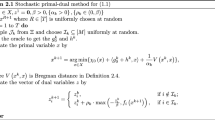Abstract
Lagrangian relaxation is useful to bound the optimal value of a given optimization problem, and also to obtain relaxed solutions. To obtain primal solutions, it is conceivable to use a convexification procedure suggested by D.P. Bertsekas in 1979, based on the proximal algorithm in the primal space.
The present paper studies the theory assessing the approach in the framework of combinatorial optimization. Our results indicate that very little can be expected in theory, even though fairly good practical results have been obtained for the unit-commitment problem.
Similar content being viewed by others
References
Bertsekas, D.P.: Convexification procedures and decomposition methods for nonconvex optimization problems. J. Optimization Theory Appl. 29, 169–197 (1979)
Bertsekas, D.P., Lauer, G.S., Sandell, N.R., Posberg, T.A.: Optimal short-term scheduling of large-scale power systems. IEEE Transactions on Automatic Control AC-28, 1–11 (1983)
Daniilidis, A., Lemaréchal, C.: Proximal convexification procedures in combinatorial optimization. RR 4550, Inria, 2002, http://www.inria.fr/rrrt/rr-4550.html
Danskin, J.M.: The theory of max-min with applications. SIAM J. Appl. Math. 14 (4), 641–655 (1966)
Dubost, L., Gonzalez, R., Lemaréchal, C.: A primal-proximal heuristic applied to the french unit- commitment problem. Submitted to Mathematical Programming
Falk, J.E.: Lagrange multipliers and nonconvex programs. SIAM J. Cont. 7(4), 534–545 (1969)
Feltenmark, S., Kiwiel, K.C.: Dual applications of proximal bundle methods, including Lagrangian relaxation of nonconvex problems. SIAM J. Optimization 10(3), 697–721 (2000)
Geoffrion, A.M.: Lagrangean relaxation for integer programming. Math. Program. Study 2, 82–114 (1974)
Hiriart-Urruty, J.-B., Lemaréchal, C.: Convex Analysis and Minimization Algorithms. Springer Verlag, Heidelberg, 1993, Two volumes
Hiriart-Urruty, J.-B., Lemaréchal, C.: Fundamentals of Convex Analysis. Springer Verlag, Heidelberg, 2001
Lemaréchal, C.: Lagrangian relaxation. In: M. Jünger, D. Naddef (eds.), Comput. Combinatorial Optimization, Springer Verlag, Heidelberg, 2001, pp. 115–160
Lemaréchal, C., Pellegrino, F., Renaud, A., Sagastizábal, C.: Bundle methods applied to the unit-commitment problem. In: J. Doležal, J. Fidler (eds.), System Modelling and Optimization, Chapman and Hall, 1996, pp. 395–402
Lemaréchal, C., Renaud, A.: A geometric study of duality gaps, with applications. Math. Program. 90(3), 399–427 (2001)
Magnanti, T.L., Shapiro, J.F., Wagner, M.H.: Generalized linear programming solves the dual. Management Science 22(11), 1195–1203 (1976)
Rockafellar, R.T.: Augmented Lagrange multiplier functions and duality in nonconvex programming. SIAM J. Cont. 12, 268–285 (1974)
Rockafellar, R.T., Wets, R.J.-B.: Variational Analysis. Springer Verlag, Heidelberg, 1998
Author information
Authors and Affiliations
Corresponding author
Rights and permissions
About this article
Cite this article
Daniilidis, A., Lemaréchal, C. On a primal-proximal heuristic in discrete optimization. Math. Program. 104, 105–128 (2005). https://doi.org/10.1007/s10107-004-0571-2
Received:
Accepted:
Published:
Issue Date:
DOI: https://doi.org/10.1007/s10107-004-0571-2




